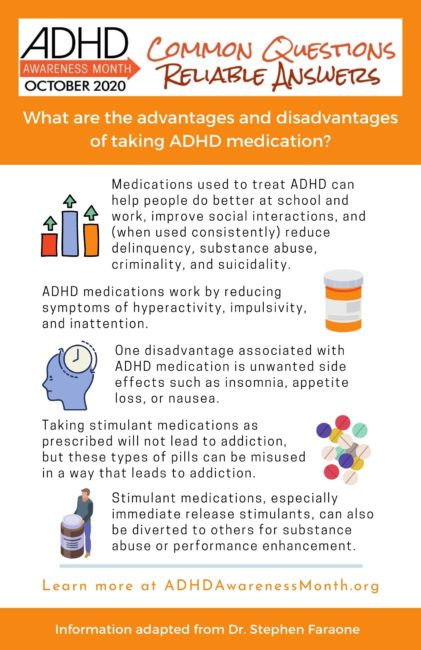The medications used to treat ADHD have many advantages. By reducing symptoms of hyperactivity, impulsivity and inattention, they help patients with ADHD to do better at school and work. They also improve interactions with family members and friends. Treatment with ADHD improves motor vehicle driving skills and decreases accidents of all kinds. From large medical registry studies of stimulant medications, we know that consistent medication use reduces delinquency, substance abuse, criminality and suicidality.
There are two types of disadvantages of the mediations used to treat ADHD. The first type of problem is that these medications can cause unwanted side effects such as insomnia, appetite loss or nausea. But for most patients, these side effects can be controlled by reducing the dose or changing medications.
The second type of problem applies to the stimulant medications, which are addictive substances. Although taking stimulant medications as prescribed will not lead to addiction, they can be misused in a way that leads to addiction. They can also be diverted to others for either substance abuse or performance enhancement. This is especially problematic for immediate release stimulants.
About the Author

Professor Faraone is Distinguished Professor and Vice Chair for Research in the Department of Psychiatry at SUNY Upstate Medical University. He is also Senior Scientific Advisor to the Research Program Pediatric Psychopharmacology at the Massachusetts General Hospital. Prof. Faraone studies the nature and causes of mental disorders in childhood and has ongoing research in psychiatric genetics, psychopharmacology, with a current focus on machine learning approaches to these areas. An author on over 1000 journal articles, editorials, chapters and books, in 2005, the Institute for Scientific Information determined him to be the second highest cited author in the area of Attention Deficit Hyperactivity Disorder and the fourth most highly cited researcher in psychiatry for the preceding decade. From 2014 to 2019 he has been listed as a highly cited researcher by Thomson Reuters/Clarivate Analytics. In 2019, his citation metrics placed him in the top 0.01% of scientists across all fields . His lifetime H-Index as of March 2020 was 208. Prof. Faraone is Editor for the journal Neuropsychiatric Genetics. He heads the educational website www.adhdinadults.com. He is President of the World Federation for ADHD and a Board member for the American Professional Society of ADHD and Related Disorders. In 2002, Professor Faraone was inducted into the CHADD Hall of Fame in recognition of outstanding achievement in medicine and education research on attention disorders. In 2010 he received the Chancellor’s Award for Excellence in Scholarship and Creative Activities from the State University of New York. In 2018 he received the Lifetime Achievement Award from the International Society of Psychiatric Genetics and in 2019 he received the Paul Hoch Award from the American Psychopathological Association.
References
- Cortese, S., N. Adamo, C. Del Giovane, C. Mohr-Jensen, A. J. Hayes, S. Carucci, L. Z. Atkinson, L. Tessari, T. Banaschewski, D. Coghill, C. Hollis, E. Simonoff, A. Zuddas, C. Barbui, M. Purgato, H. C. Steinhausen, F. Shokraneh, J. Xia and A. Cipriani (2018). “Comparative efficacy and tolerability of medications for attention-deficit hyperactivity disorder in children, adolescents, and adults: a systematic review and network meta-analysis.” Lancet Psychiatry 5(9): 727-738.
- Faraone, S. V., P. Asherson, T. Banaschewski, J. Biederman, J. K. Buitelaar, J. A. Ramos-Quiroga, L. A. Rohde, E. J. Sonuga-Barke, R. Tannock and B. Franke (2015). “Attention-deficit/hyperactivity disorder.” Nat Rev Dis Primers 1: 15020.
- Chang, Z., L. Ghirardi, P. D. Quinn, P. Asherson, B. M. D’Onofrio and H. Larsson (2019). “Risks and Benefits of Attention-Deficit/Hyperactivity Disorder Medication on Behavioral and Neuropsychiatric Outcomes: A Qualitative Review of Pharmacoepidemiology Studies Using Linked Prescription Databases.” Biol Psychiatry.

